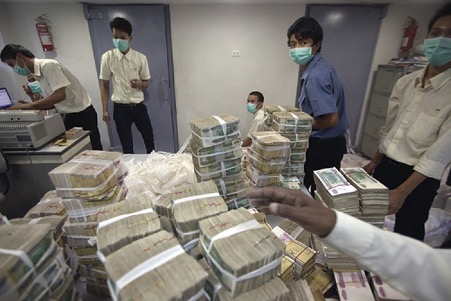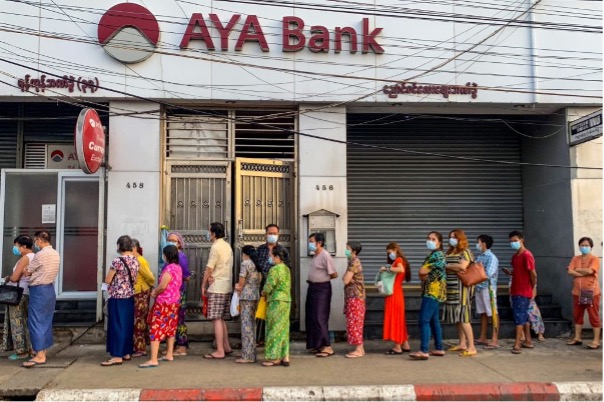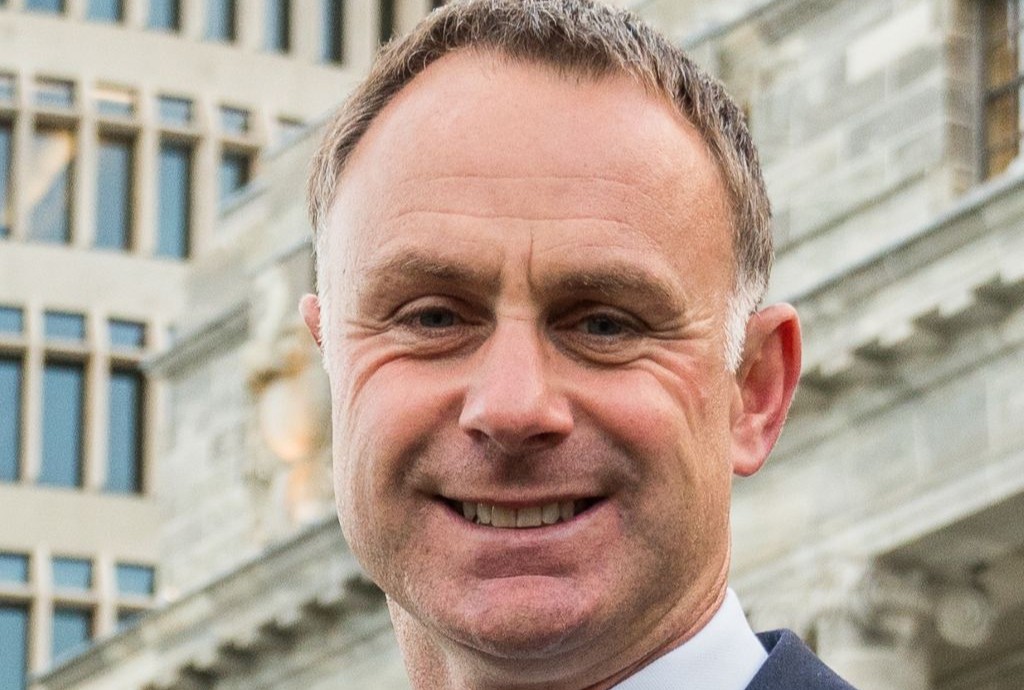Table of Contents
9th May 2021
I scratched around for a suitable responsible heading for today’s second update but in the end, I can’t think of a better one than the one I have used.
By closing down the internet and mobile phone services the military put great pressure on a banking system that had gone from a cash only society to electronic banking in 4 years.

The banking system collapsed in 2003 with a resulting lack of trust in banks. That trust had slowly been rebuilt and a working system had developed by 2016/17.
A crisis of confidence looms over Myanmar’s banks
Years of effort to rebuild trust in the banking sector after the crippling 2003 financial crisis have been wasted due to the military’s seizure of power and its manipulation of the Central Bank. By KHINE | FRONTIER.
Long queues outside private banks have become a common sight in recent weeks with the gradual reopening of branches, nearly all of which closed in early February when staff joined the Civil Disobedience Movement calling for an end to military rule.

The piecemeal resumption of services followed dire warnings from the Central Bank of Myanmar in early March. At about the same time, a letter purportedly from the junta, or State Administration Council, to the Central Bank that leaked online threatened private banks with the forced transfer of some accounts if they did not reopen.
The situation has been unnerving for customers, who say their confidence in private banks is rapidly diminishing. But although the CDM temporarily wreaked havoc on the sector, customers’ trepidation has less to do with the anti-coup movement than the counter-productive policies of the junta-controlled Central Bank.
Although the strike by employees shut down the banks for weeks after the February 1 military coup, the institutions continued to replenish their ATMs – albeit inconsistently – enabling customers to make withdrawals up to K1 million-a-day limit. Moreover, many customers could arrange transfers through mobile banking services, bypassing the need for cash in some transactions.
However, this option was closed for most people when the junta shut down mobile data, public Wi-Fi and fixed wireless internet services in an effort to disrupt the resistance movement. Only those with a fibre optic cable connection were able to use the internet.
With little mobile banking available, customers are having to rely on ATM withdrawals to get cash, or join long queues at bank branches and wait for hours to withdraw funds from their accounts.
The situation was aggravated by the Central Bank’s decision, announced on March 1, to limit ATM withdrawals to K500,000 a day, and passbook withdrawals at K2 million a week for individuals and K20 million a week for companies.
However, in practice, most banks permit only smaller amounts to be withdrawn. KBZ Bank permits withdrawals of up to K200,000 from ATMs and K1 million a week from a passbook account. AYA Bank and AGD Bank limit ATM withdrawals to K150,000 a day. Stringent limits on the number of customers served at branches each day have also made it harder for people to access the money in their accounts.
Because of these obstacles, businesses are increasingly demanding cash payments rather than electronic transfers, which is only compounding the broader problem.
Another factor creating demand for cash is the slide in the value of the kyat against the US dollar, from K1,350 at the end of January, to about K1,600 at the end of April, a decline of 18 percent in three months. People want to withdraw cash from their accounts to buy gold or US dollars as a hedge against a weakening kyat.
In response to this situation, a market has emerged in which bank customers are selling deposits from their accounts in exchange for cash. For example, customer A agrees to transfer K10 million to the account of customer B, who receives K9.7 million in cash, and customer A makes a profit of 300,000, or 3pc. The Central Bank announced that the practice was illegal, and action would be taken against offenders.
With cash generally flowing only one way – out of, rather than into, banks – and bank loans going unpaid, banks have opened special counters to process deposits. However, the counters are largely empty because few people want to make deposits.
To encourage people to put money into the banks, the Central Bank issued another announcement, advising that from May 3 bank customers could open new accounts on which there would be no withdrawal limits. However, the arrangement is unlikely to result in many new bank accounts or a large injection of cash back into the banking system, because people no longer have confidence in this system.
Not only is the solvency of the banks – and the security of people’s savings – in question, but recent moves by the Central Bank have also threatened bank customers’ privacy. For instance, on March 19, the Central Bank ordered private banks to provide it with a list of all customers with safety deposit boxes, whose identity is meant to be kept secret.
The latest developments are a huge setback for the considerable efforts made to rebuild public confidence in banks and encourage the use of their services since the devastating financial crisis of 2003.
After U Thein Sein’s Union Solidarity and Development Party government took office in 2011, the development of the banking sector was given priority, and foreign banks were allowed to open branches in the country. The banking sector would go on to achieve rapid development, particularly during the term of the subsequent National League for Democracy government from 2016 until the February 1 coup.
In staging its takeover, the military has prioritised its desire for power over the public interest and has undermined or tainted many of the institutions that people have come to rely on. Meanwhile, its efforts to restart the economy using threats and coercion has made things worse – and has left Myanmar’s fragile banking system on the brink of collapse.
Khine is the pseudonym of a Myanmar journalist and commentator based within the country.
Source Frontier May 9th, 2021.
Commercial trading is becoming nearly impossible, and the economy is verging on destruction. The generals will have succeeded in destroying the value of all their own investments as well.
Please share this article so that others can discover The BFD









